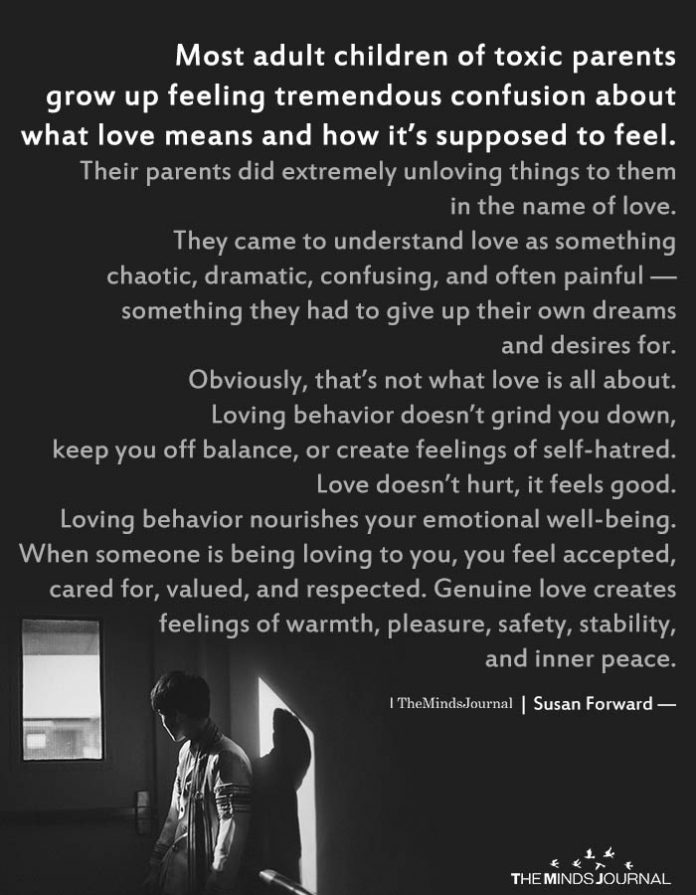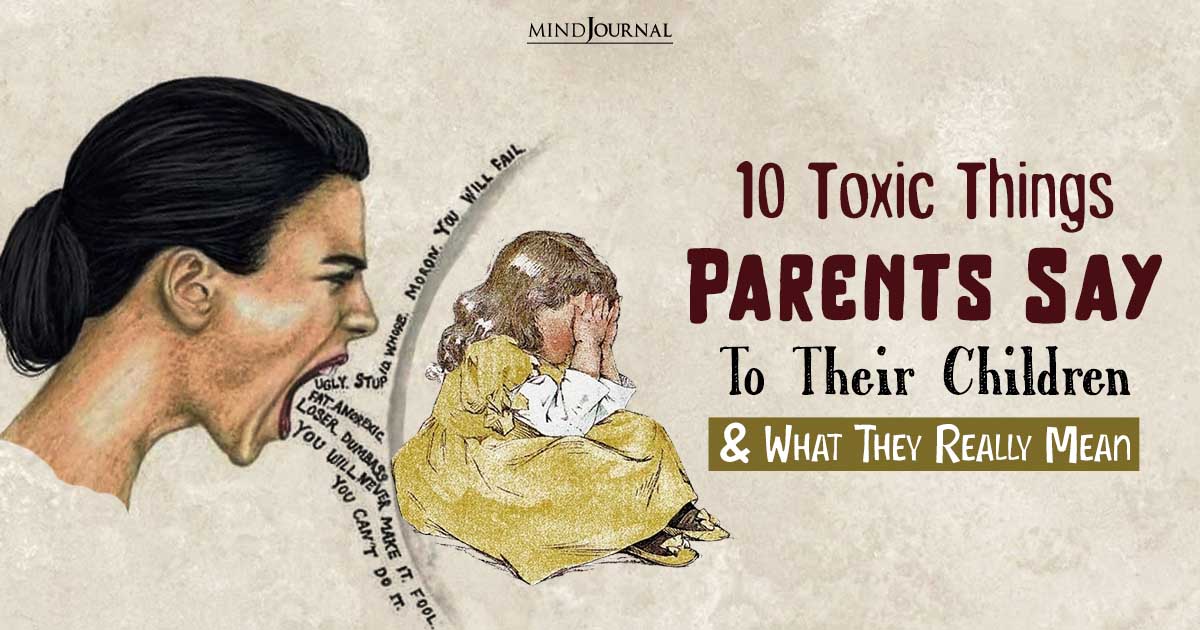There are so many toxic things parents say and it can linger in the memory of children. Let’s explore what toxic parents say and try to understand what they mean and the impact it has on their children.
Having a toxic and narcissistic person as your parent is nothing short of a curse. The constant ridicule, criticism, insults, and emotional neglect can easily take a toll on you. There are so many hurtful and damaging things toxic parents say to their children, that stay with them for the rest of their lives.
No matter how far you get away from them, and no matter how happy you might be in your life, their harsh words are always there at the back of your mind.
Toxic parents inflict a lot of emotional and mental damage on their children, sometimes even knowingly.
All the toxic things parents say to their children are a reflection of who they are as people, and the worst part of this is that they feel absolutely no remorse for their horrible words. Nor do they realize the damage they do to their children’s emotional, mental, and psychological well-being.
With time children might get used to what toxic parents say to them, but does it mean you don’t care anymore? Or that can just shut them out? Of course not! Their words still damage your psyche and your self-esteem, it’s just that you get better at not showing your hurt and pain openly.
Read on to know the 10 things toxic parents say and the real meaning behind their poisonous words.
Related: 20 Clear Signs You Are The Child Of Toxic Parents
10 Toxic Things Parents Say To Their And What They Really Mean
1. “I never said that. You are simply making things up!”
This statement is gaslighting at its finest, and if you are living with a toxic parent then be rest assured you will be hearing this a lot. When your toxic parents say or do something questionable and painful and you confront them about it, they will simply deny it and put the blame on you by accusing you of making it up.
Toxic parent behavior dictates that they should never take responsibility for their words and actions because they are incapable of doing that. If you try to hold them accountable, they will deny everything and pretend that they are absolutely innocent.
2. “You need to relax, I was just joking. Why can’t you take a joke?”
Toxic parents say a lot of derogatory things under the guise of humor because that way they can get away with it. They will say horrible stuff about you and if you react they will simply say that they were joking, and you need to chill out.
The fact that they mocked, ridiculed, and humiliated you doesn’t register in their brains, and as usual, they wash their hands of the responsibility of owning up to it. For example, having a toxic mother means she might ‘joke’ about your physical appearance, but you’re not allowed to feel bad about it.

3. “I sacrificed a lot for you. Whatever you’re today is because of me, so be grateful for it.”
This is one of those things toxic parents say when they want you to feel indebted to them for life. They conveniently forget the fact that as a parent it’s their responsibility to take care of you and give you a good life and instead use their basic responsibility as a way of manipulating you into doing what they want you to do.
They will attack you every time you go against them, but try not to let this get to you. They do this because deep, down inside they are highly unsatisfied and unhappy with how their lives turned out.
They couldn’t achieve what they wanted, and now in order to compensate for that, they are dumping their beliefs and broken dreams on you and forcing you to fulfill them.
Related: Toxic Mother Daughter Relationships: Can You Identify These 8 Dysfunctional Patterns?
4. “You are exactly like your father!”
In case your parents are separated or divorced, and you have a toxic mother, then she will try her best to damage the relationship you have with your father by constantly badmouthing him to you. She has a lot of anger, bitterness, and resentment towards him, which is why she portrays him as a villain and tries to turn you against him.
She refuses to take accountability for the part she played in their divorce. Instead of handling the whole thing in a dignified and emotionally mature way, she projects all her negativity on you and expects you to hate your father the same way she does.
5. “You are so ugly/short/skinny/fat.”
One of the most horrible and toxic things parents say is when they insult you about how you look. Constantly mocking you, ridiculing you, humiliating you, and degrading you on the basis of your physical appearance doesn’t just knock your confidence, but also has a permanent detrimental impact on your self-esteem.
Toxic parents do that because they suffer from body image issues themselves (even though they will never admit it), and in order to feel better about their insecurities, they put you in their line of fire. Constant insults and jabs towards your physical appearance can lead to eating disorders and various emotional issues in the long run.
6. “You should be more like your brother/sister/cousin.”
When parents compare siblings with each other, it can cause a lot of emotional damage and self-esteem issues in children. Parents are supposed to treat all their children equally, but toxic parents don’t, and this is just one of the many examples of things toxic parents say.
Every child is unique, and when toxic parents draw unfair comparisons, they knowingly or unknowingly pit them against each other. This doesn’t just damage their sense of self-worth, it also damages the relationship they share with each other, leading to a toxic sibling rivalry.
Related: 13 Signs Of A Toxic Parent
7. “I am only doing this for your own good, because I am your mother/father and I know best.”
This is again one of the best examples of things toxic parents say when it comes to manipulating their children into doing what they want them to do. Toxic parents believe that they understand your needs better than you do, and that’s why they should get to make all the decisions about your life.
They will use this excuse to treat you any way they want, and you can’t say anything about it. This one statement gives them the license to treat you as cruelly as they want, and they feel free to control your life the way they want.

8. “Having you was a mistake. I wish you were never born!”
This is one of the most toxic things parents say to their children, and if you’ve ever had to hear this, then I am so, so sorry. When parents say something like this to their children, it shakes their belief in everything in life and the worst part of it all? You start to question your existence and believe that you’re nothing but a burden.
Feeling unnecessary and unwanted by your parents is one of the worst feelings ever, and to go through this day in and day out can be crushing. This kind of thing stays with you for the rest of your life, and can even lead to depression, anxiety, and suicidal tendencies.
9. “You are so useless and stupid! You will never amount to anything in life!”
Verbal abuse might not cause you physical wounds, but the emotional pain and scars caused by it are far greater and more heartbreaking. If your parents are always making you feel like you’re not good enough or talented enough or worthy enough, then it’s just a matter of time before you start believing it yourself.
Making you feel like a loser is one of the worst toxic parent traits there is. Be it a toxic mother, toxic father, or worse, both, making your child feel worthless and stupid is truly despicable.
Related: 12 Signs You Have A Toxic Parent and How To Deal With It
10. “It’s not my fault that you’re so over-sensitive.”
What toxic parents say to their children? This! This right here is one of the many things toxic parents say and what makes them, THEM! When they say something like this, they are basically telling you that they will say whatever they want, but you’re not allowed to react.
Instead, you will keep quiet, keep your head down and take the verbal assault they are throwing your way.
No matter how hurt and devastated you might feel hearing those painful words, you have to be strong and be okay with it all. And if you try to hold them accountable for their disgusting actions, they will term you as over-sensitive, and refuse to acknowledge that it was them who made a mistake.
How To Deal With The Things Toxic Parents Say?
Now that you know all about the toxic things parents say, it’s time to know what you can do to protect your mental and emotional wellbeing from being destroyed because of their actions.
There are a few things you can do to make sure that their words and actions don’t end up disrupting the rest of your life.
1. Draw some much-needed boundaries.
How to set boundaries with toxic parents? Setting boundaries helps you let people know what they are allowed to do and what they’re not. However, when it comes to toxic parents things might not be that easy, because they don’t respect the limits you might practice.
In such a situation, don’t lose hope. Keep on setting boundaries, and if needed, limit your contact with them. If they want to come to your house tell them that you’re busy and you can’t have them at the moment. No matter how hard they might try to resist your boundaries, hold strong onto them.
Related: 14 Smart Ways To Deal With A Difficult Mother In Law
2. Be careful about what you share with them.
Even if they are toxic, you still harbor a lot of love for them, don’t you? They are your parents after all. However, don’t let your love for them blind you to the fact that they are not good people. Be mindful about what you’re sharing with them about your personal life and feelings because you never know when they might use those things against you.
Trust is extremely important in every kind of relationship, including the one you share with your parents. If they gossip about you, disclose your personal stuff in front of others without your consent, or criticize you, then that trust is not there. That’s why always be careful about the things you share with them.
3. Accept that they might never change.
No matter how hard this is to accept, you need to realize that your toxic parents might never change, and they might never treat you with the love and respect you deserve. If you keep on trying to change people who do not want to change you will just be wasting your time and disappointing yourself more.
Instead, you need to think about how you respond when you are around them, and what you need to do to feel happier and more positive in their presence.

4. Know when to leave when the situation seems to get worse.
Always know that you don’t have to sit around and get insulted, just because it’s your parents sitting opposite you and not a stranger. Whenever you feel that the situation is getting worse, and your parents are crossing all their limits, then get up and leave the situation.
You cannot change them, but what you can do is protect your sanity by doing what’s best for you. The moment you see things deteriorating and going south, make your exit and don’t look back.
Related: 5 Signs You Should Break Up With Your Toxic Parents For Good
Takeaway
Having toxic parents and dealing with all the poisonous things toxic parents say can be crushing and heartbreaking. But always remember one thing – change starts with you. You do not have to stick around and get insulted day in and day out just because they are your parents.
You get to choose what you want in your life and what you don’t. Only you are responsible for your happiness and mental peace, and only you can decide what role your parents are going to play in your life.
No matter what decision you make, love yourself, be kind to yourself and treat yourself with a lot of compassion.
Frequently Asked Questions (FAQs)
Why are parents toxic?
There can be many reasons behind parents being toxic, and some of the most common reasons are an unhappy childhood, childhood emotional neglect, childhood abuse, substance abuse, mental health issues, and personality disorders.
What are the signs of a toxic mom?
Some of the major signs of a toxic mother are she fails to respect your boundaries, constantly compares you with your siblings, overreacts whenever you disagree with her, criticizes you excessively, and refuses to apologize for her mistakes.
How to deal with toxic parents as a teenager?
Let your parents know how they are hurting you and how much their actions and words are affecting you. Tell them your academics are getting affected because of the unhealthy atmosphere at home. If still nothing changes, going to therapy or your school counselor is a good idea.
How toxic parents affect you?
What toxic parents say or do can emotionally hurt you. They do not understand the meaning of compassion, and always seek to hurt and belittle their children as much as they can. They are overly critical, manipulative, controlling, and have zero empathy towards the pain of their children.












Leave a Reply